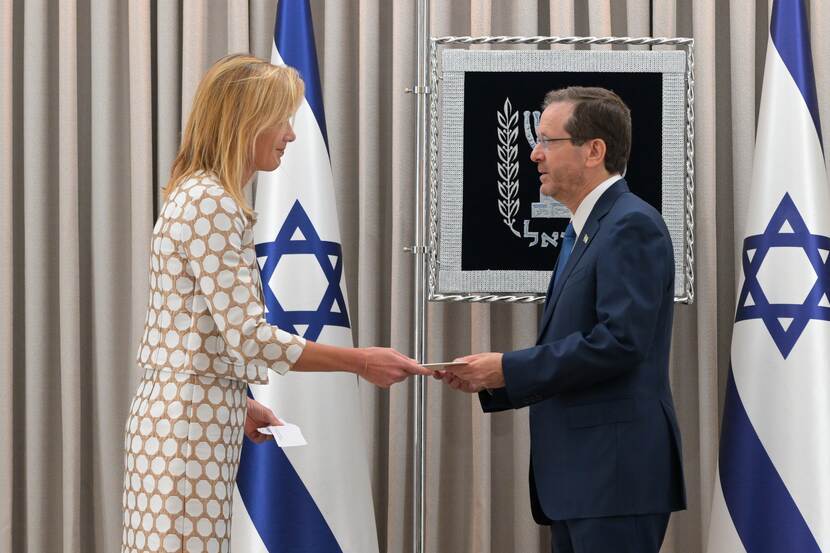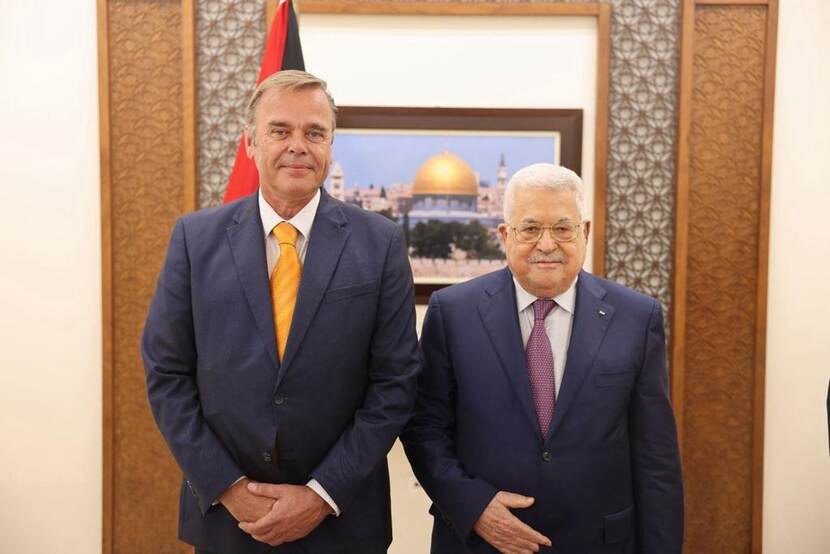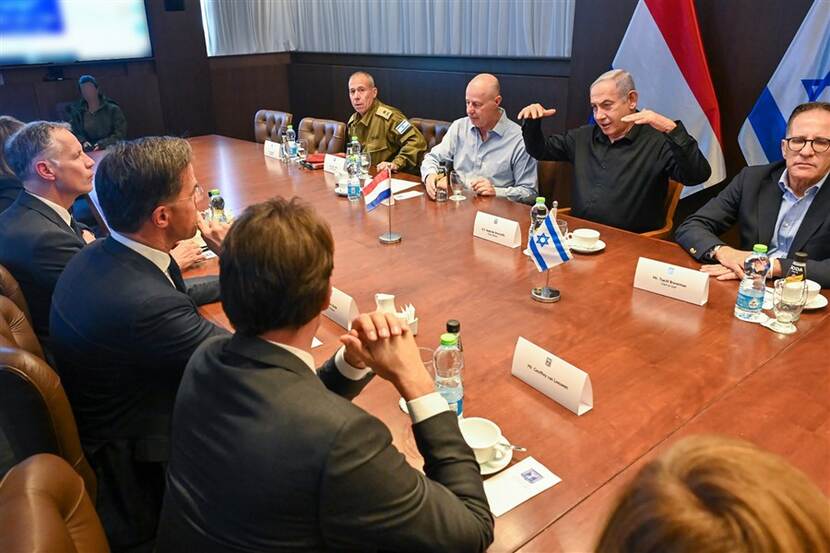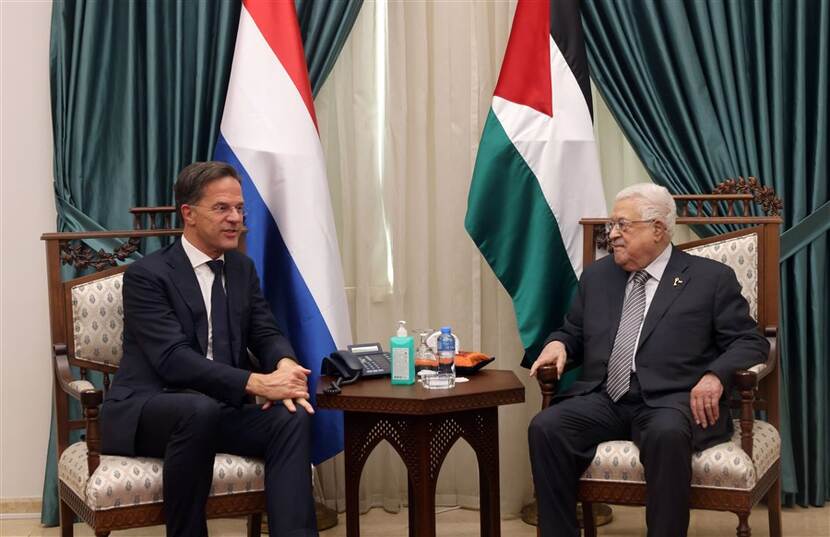New phase for Dutch diplomats in Israel and the Palestinian Territories: ‘We’re very worried about Dutch nationals in Gaza.’
Weblogs
Shortly after heavy fighting broke out between Israel and Hamas on 7 October, we spoke to Marriët Schuurman (Dutch ambassador to Israel, in Tel Aviv) and Michel Rentenaar (Dutch representative in the Palestinian territories, in Ramallah). Today they describe how the situation has developed in recent weeks, and how they are working tirelessly – publicly and behind the scenes – to help all Dutch nationals trapped in Gaza: ‘We’re very worried.’
This is the English translation of the interview that was published in Dutch on October 31st.
Appalling situation
Last Saturday, heavy fighting made communication with Gaza impossible. However, connections were restored during the weekend, and contact was resumed with all Dutch nationals in the area. This is crucially important, as Michel explains. ‘The Dutch nationals in Gaza and the local population are all trapped in an appalling situation. We can hardly imagine what hostage Ofir Engel and his family are going through right now. Or the other Dutch nationals stranded in Gaza – 27 of them as far as we know – and their immediate families, waiting in fear and uncertainty. We’re in close contact with them, and we’re doing all we can to get them out of Gaza. We’re working with other countries who often have far more of their own nationals trapped there. Last week we received the tragic news that one of the Dutch citizens had been killed. At the time I found it extremely difficult to talk to her son, but making that contact is so very important.’
We can hardly imagine what hostage Ofir Engel and his family are going through right now
Fortunately, on the West Bank, there are several ways of getting stranded Dutch nationals out. ‘Sometimes it’s literally a matter of just getting into a car and driving,’ Michel continues. ‘A Dutch woman was trapped with no way out because everything was sealed off. You literally can’t get from one village to another. So we went to rescue her with our official car because our diplomatic immunity allows us to pass unhindered through the checkpoints. We managed to get her to the border crossing between the West Bank and Jordan, and from there she was able to return safely to the Netherlands.’
Crisis mode
Meanwhile, both missions are cautiously reviewing the outbreak of the hostilities. ‘Although the initial shock is over, we’re still in crisis mode, of course. However, what this means in practice is different from two weeks ago,’ Marriët explains. ‘In the first few days and weeks, our priority was repatriating stranded Dutch nationals. When that was done, we started preparing for all kinds of other possible scenarios. In the most extreme case, we may have to consider evacuating all Dutch citizens and other eligible people, but you never know whether that will be possible if the conflict escalates further.’
A grim start

For Marriët, who took up her post as ambassador in Tel Aviv just two months ago, it’s been a grim start to her new job. She commented, ‘I only just presented my letters of credence last Tuesday in a sped-up ceremony with 13 other ambassadors. Although the occasion was totally different than normal, I still felt it was important in view of the current situation. As if to say: despite everything, diplomacy goes on.’
Despite everything, diplomacy goes on
Priorities
As ambassador, Marriët currently has two major priorities. ‘First of all I need to give my colleagues in The Hague a clear picture of the context here so that they can make well-considered decisions. And I also need to ensure that my staff here can cope in these very difficult circumstances and can confide in me.’
This means her diplomatic work is different than she is used to. ‘Normally speaking, I would be making the rounds and getting to know everyone personally. But now I have to phone them without ever having met them because there’s an emergency and things need to get done. Things are not quite as they should be.’
An exhausting few weeks
As a diplomat, Michel has already experienced a number of war situations, but for him and his team at the Dutch representation in Ramallah, the past few weeks have been exhausting. ‘Shortly after the attacks by Hamas we had our crisis organisation under control,’ he says, looking back. ‘Roles were assigned and everyone has been working tirelessly, but now we notice that our staff are getting worn out. So wherever possible, we try to encourage people to take breaks, too.’
In this regard, Michel and Marriët seem to be in similar situations. However, right now the reality in Gaza is really different from what it is in Israel, Michel explains. ‘At the moment, my days are mainly filled with humanitarian diplomacy. A massive humanitarian disaster is unfolding in Gaza. There are many thousands of dead. And most of them are civilians, including many children. It’s indescribable.’
Diplomatic pressure
That compels him to regularly go to extremes, he explains. ‘We’re trying to exert diplomatic pressure on all the parties, like Israel, Egypt and the United Nations, to get more humanitarian aid into Gaza.’ But so far, progress has been slow.

‘Through Minister Liesje Schreinemacher the Netherlands has earmarked €25 million for humanitarian aid but this is only stage one. Now we need to get the aid into the country. Every day, only a few dozen lorries with aid are being allowed into Gaza, compared with many times that on an average day before the war. This shows how acute the emergency is becoming.’
The human side
For the interview, Michel takes us out into the open air. And as he speaks, you can hear the sound of children playing in the background. It’s an almost surreal contrast with the reality confronting him every day. He continues, ‘I’ve just been over to the ‘Feel Beit’ cultural centre (the name means ‘home’ in Arabic). It’s one of the last places where Israelis and Palestinians still meet, embrace one another and try to keep things normal.’ This place makes him feel emotional, he says. ‘The people who come here are not really interested in the endless debate about who’s to blame, and above all, they try not to lose sight of each other’s humanity. That’s really amazing under these circumstances, but ultimately, this is what it all comes down to.’
Feel Beit’ cultural centre, the name means ‘home’ in Arabic, is one of the last places where Israelis and Palestinians still meet, embrace one another and try to keep things normal
Collaboration
In this explosive context, the Netherlands’ diplomatic representations in Tel Aviv and Ramallah are working well together. As Marriët puts it, ‘The repatriation of Dutch nationals at the beginning of the war was really a joint effort between Tel Aviv and Ramallah, with excellent support from the Ministry of Defence and our people at the foreign ministry in The Hague. Their input enabled our staff at both missions to assist stranded Dutch nationals in the best possible way at the airport.’
Michel adds, ‘Cooperation between the two missions is excellent, as indeed it already was before the conflict. It isn’t always easy. You can soon get locked into one or other of the two narratives. For instance, we’ve got two policy officers working 50% of the time in Ramallah and 50% in Tel Aviv. That really helps us to understand both sides of the story, especially now.’
Visit by Mark Rutte
The two Dutch diplomats are not the only ones pursuing diplomatic routes to de-escalate this violent conflict. The Dutch government is also doing what it can: for instance, last Monday Prime Minister Mark Rutte paid a visit to the conflict zone. Marriët comments, ‘The visit went very well. It’s highly significant that Mark Rutte went not only to Israel but also the West Bank. And that he had a clear message for both the Israeli prime minister Benjamin Netanyahu and the Palestinian Authority leader Mahmoud Abbas.’
Michel adds, ‘Rutte’s visit was indeed very significant. He was the first Western leader to visit both Netanyahu and Abbas. That opened up the diplomatic channel with the Palestinian Authority which had been shut tight during the first two weeks of the conflict. And you could tell that Rutte had opened a door because a day later, the French president Emmanuel Macron went there and now other countries are also considering it. It really is so important because there are two sides to this story. In addition, it’s also vital to distinguish between the Hamas terrorist organisation and the Palestinian people, who are suffering terribly.’
Prime Minister Mark Rutte met with both the Israeli Prime Minister Benjamin Netanyahu and President Mahmoud Abbas of the Palestinian Authority


Marriët concludes, ‘Above all, Mark Rutte’s visit had the human touch. For instance, he spoke to Ofir Engel’s family, and also to someone with relatives in Gaza. By listening to people he showed them that they’re not entirely alone in this war, which is traumatic for everyone.’
